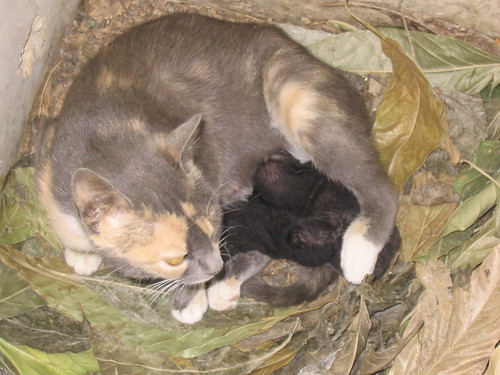Friday, April 29, 2005
Israel's stray cat problem at our door
I am not a cat-blogger; nevertheless, I have to post this picture of "our" cat Sumi and her two new kittens (please, no mazal tovs):

Sumi's not really even "ours", and never will be if I have my cruel, cold, heartless way. She is a stray kitten herself, less than a year old, and has been hanging out near our home for a while. She wouldn't even have a name except that my kids, having seen her around long enough and recognizing her, insisted that she have one. At first, I thought they were talking about an imaginary pet lawyer, "Sue-Me". While they have taken her under their little wings, I've tried to keep my distance. I don't really need cats in my life. I'm already taking care of three kids and that's plenty of work, thank you.
But I have come to think differently. Israel has such a stray cat problem that we all just filter them out, pretending they're not there. That's a lot of filtering out. There are whole packs of cats living off every garbage bin, and others staking out turf around our homes. It's gotten to the point where almost every time I drive anywhere around town, I pass over the remains of at least one organic speedbump. I've trained myself to just ignore the problem, to shrug and say "It's just part of living in Israel."
But now the problem has given birth right outside my window. Sumi's kittens will live (or die) around our house, just as she does. And so will their kittens, and their kittens, and so on and so on. All of them yowling, fighting with each other, competing for food and garbage, and eventually dying after first reproducing a few more times. These two new little suckers are cute, and I don't wish them harm, but I also don't want the rapidly multiplying troubles they represent.
Fortunately, there are steps we can take to reduce this problem. I say "we" rather than just "I" because none of us can solve this alone. Even though each of us can plausibly claim it's not our problem, we all need to work at it together to make a difference.
Believe it or not, the Israeli Ministry of the Environment has put out some helpful guidelines on this very subject. Who knew they were even aware of the problem? I sure didn't. The Ministry first makes one thing absolutely clear, that we all should know:
What does the Ministry recommend doing?
First, they give clear advice about controlling cats' access to food and garbage:
But their biggest recommendation here regards spaying and neutering, the Trap-Neuter-Release (TNR) approach. While many have religious objections to interfering in the reproductive life of cats, Ministry-sponsored studies in Israel make clear that this approach has the potential to truly control the problem. Anyone who feeds stray cats ideally should take the responsibility for that cat's spaying, even if it doesn't become a house cat. Even still, there are hordes of other felines no individual will be able to humanely handle alone. It is here where local authorities must cooperate, and we can help by pressuring for action in this area. Remember, the Ministry mentions matching funds for this activity, and I'm pretty sure local authorities love matching funds.
More info on TNR:
Technorati Tags: blog, stray cats, israel, kittens
If you really, really liked this -- or even really, really hated it -- there's lots more:

Sumi's not really even "ours", and never will be if I have my cruel, cold, heartless way. She is a stray kitten herself, less than a year old, and has been hanging out near our home for a while. She wouldn't even have a name except that my kids, having seen her around long enough and recognizing her, insisted that she have one. At first, I thought they were talking about an imaginary pet lawyer, "Sue-Me". While they have taken her under their little wings, I've tried to keep my distance. I don't really need cats in my life. I'm already taking care of three kids and that's plenty of work, thank you.
But I have come to think differently. Israel has such a stray cat problem that we all just filter them out, pretending they're not there. That's a lot of filtering out. There are whole packs of cats living off every garbage bin, and others staking out turf around our homes. It's gotten to the point where almost every time I drive anywhere around town, I pass over the remains of at least one organic speedbump. I've trained myself to just ignore the problem, to shrug and say "It's just part of living in Israel."
But now the problem has given birth right outside my window. Sumi's kittens will live (or die) around our house, just as she does. And so will their kittens, and their kittens, and so on and so on. All of them yowling, fighting with each other, competing for food and garbage, and eventually dying after first reproducing a few more times. These two new little suckers are cute, and I don't wish them harm, but I also don't want the rapidly multiplying troubles they represent.
Fortunately, there are steps we can take to reduce this problem. I say "we" rather than just "I" because none of us can solve this alone. Even though each of us can plausibly claim it's not our problem, we all need to work at it together to make a difference.
Believe it or not, the Israeli Ministry of the Environment has put out some helpful guidelines on this very subject. Who knew they were even aware of the problem? I sure didn't. The Ministry first makes one thing absolutely clear, that we all should know:
This solution is indeed tempting. It's a simple thing to just drop kitty in a box and drive it a few miles down the road (I might have experience on this one, but don't tell my kids). But it doesn't do anything to permanently solve the problem (as our case proves). In fact, even killing cats won't do the trick, since it doesn't close the ecological niche the cats were exploiting, and new cats quickly replace the old ones.
Moving cats from their natural environment may be an offense under the law, but it is also likely to exacerbate the overpopulation problem since it creates an ecological vacuum. When existing cats are removed from a cat colony, new strays, which are not neutered, simply move in and the breeding population explosion continues.
What does the Ministry recommend doing?
First, they give clear advice about controlling cats' access to food and garbage:
So we can all help by controlling our garbage, and by feeding cats properly when we do feed them.
The following solutions should be seen as part of an overall approach, and not as recommendations that can be selectively implemented:
- Street cats must be fed in accordance with guidelines provided by the local veterinarian, according to municipal by-laws and guidelines for dealing with feral cats prepared by the Veterinary Services of the Ministry of Agriculture.
- In authorities where it is permitted by law, cats should be fed in public areas.
- Feeding requires good quality food that doesn’t spoil, doesn’t litter and doesn’t disperse in the area (dry food is recommended).
- Water should be provided.
- It is important to collect any leftover food as well as dishes at the end of the feeding period and to ensure that the area is clean.
- Medical treatment should be provided when needed to ensure the health of the cats.
- The cats should be fed at regular times, to the extent possible, and in a demarcated area.
Dealing with the Problem in Local Authorities
- Providing information and instructing the public on maintaining cleanliness.
- Scrupulously ensuring that animals have no access to garbage, improving the level of environmental sanitation, and ensuring that garbage disposal units are intact.
- The Ministry of the Environment encourages spaying and neutering by local authorities. In recent years the Ministry has provided matching funds to local authorities for this purpose. We believe that spaying and neutering street cats in accordance with the recommendations of research on the subject will preserve the ecological balance in this area. The cat population will remain stable, and both the intrusion of new cats and proliferation of pests will be limited.
- The Ministry of the Environment encourages cooperation between regular cat feeders and local authorities through the establishment of feeding stations and their support.
But their biggest recommendation here regards spaying and neutering, the Trap-Neuter-Release (TNR) approach. While many have religious objections to interfering in the reproductive life of cats, Ministry-sponsored studies in Israel make clear that this approach has the potential to truly control the problem. Anyone who feeds stray cats ideally should take the responsibility for that cat's spaying, even if it doesn't become a house cat. Even still, there are hordes of other felines no individual will be able to humanely handle alone. It is here where local authorities must cooperate, and we can help by pressuring for action in this area. Remember, the Ministry mentions matching funds for this activity, and I'm pretty sure local authorities love matching funds.
More info on TNR:
The Cat Welfare Society of Israel has more on the subject.
Today there is an alternative to traditional stray cat population control that is gaining support around the world. It is called Trap-Neuter-Release (TNR). It is based on the spaying and neutering of the cat colonies which are maintained by caretakers who continue to feed and care for the colonies.
- Since they are sterilized, they can't contribute to the over population problem.
- The fighting, the screaming and yowling are greatly reduced.
- They are content to stay within their own territory but they still follow their own instinct to defend their territory from outside cats that they see as intruders.
- The cats are healthier and look healthier.
- The population is stabilized.
Technorati Tags: blog, stray cats, israel, kittens







